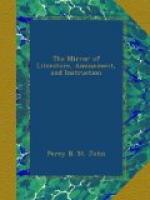By intently gazing—by straining my sight
to the uttermost, I made out that the young lady was
standing on a point of rock, lower down, and more
conspicuous than that on which she had been seated.
She had tied her handkerchief to her parasol, and
was waving it, no doubt, as a signal to her brother.
My heart turned sick, and I could see no more.
I looked at my watch, and found that it was nearly
three hours since they had begun their ascent.
The next consideration was, what I ought to do.
If I had been certain that the brother had lost his
way, it was, no doubt, my duty to send persons from
the inn, to find him. But how did I know that
any peril existed, excepting in my own imagination?
He might have ascended before, and be perfectly acquainted
with the descent; he might be gone in search of some
particular view, and have prepared his sister for
the length of his absence, as she was too much fatigued
to accompany him. In this case, any interference
of mine would be impertinent. What should I do?
I leaned out of my window, as if in the hope of seeing
some object, which should help me to a decision.
Such an object was just before me, in the person of
an old fisherman, a next-door neighbour, and very
honest friend of mine. “Come hither, John,”
said I; and I stated the case to him. He thought
we need not fear any danger. The mountain was
not very high; he knew of no dangerous places on it;
and was of opinion that there would be light enough
to guide their steps half an hour longer. He
advised me to leave them alone, for that time at least.
I determined to do so, and sat down to my tea-table,
on which I had not yet bestowed a thought. I drew
it close to the window, and looked as earnestly as
ever; but it was now too dark to see anything but
the indistinct outlines of the mountains, and the loch
gleaming in the twilight. The half-hour passed,
and I had not seen them return; they might have returned
without my having seen them; but I could not bear
uncertainty any longer. I sent my servant to the
inn, to inquire if they had arrived, and whether they
had ordered tea, or given any expectation as to the
time of their retain.
She brought word, that though tea had been ready for
an hour past, the lady and gentleman had not returned;
and that the landlady would be glad to know whether
I could give her any intelligence of them.
“Let me pass!” said I, hastily opening
the gate.
“Your bonnet, ma’am! shall I fetch your
bonnet?” said my maid.
At that moment some one rushed past me. It was
the young lady—running, or attempting to
run, but with faltering and unequal steps. I followed
her. At the first of the flight of steps before
the inn, she stumbled and fell. She was trembling
and sobbing violently; whether from breathlessness
or agony, I could not tell. I raised her, and
assisted her to mount the steps. “My brother!
my brother!” she exclaimed incessantly.
I could get no words but these from her. No time
was to be lost. I sat down beside her, and took
both her hands; and speaking as calmly as I could,
said, “Compose yourself, and tell us what we
must do. Have you missed your brother, or has
any accident befallen him before your eyes?”




